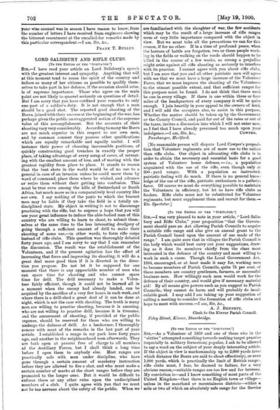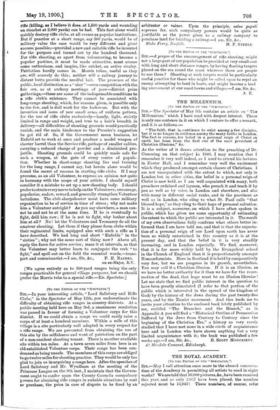(To TEE EDITOR OF THE "SPECTATOR.")
Stn,—As a Volunteer of 1859 and one of those who in the "sixties" attempted something towards making target practice (especially in military formation) popular, I ask to be allowed to say a word on the subject of your deeply interesting article. If the object in view is marksmanship up to 2,000 yards (over which distance the Boers are said to shoot effectively), or even 1,000 yards, which is practically the limit of British ranges. rifle clubs must, I fear, be doomed to failure, for a very obvious reason,—suitable ranges are too few and far between. My conviction is—and I know something of most parts of the United Kingdom—that there is no English town or village— unless in the moorland or mountainous districts—within a mile or two of which an absolutely safe range for the Service
rile (killing, as I believe it does, at 1,500 yards and wounding on ricochet at 2,000 yards) can be had. This fact alone would quickly destroy rifle clubs, at all events as popular institutions. But if practice at a short range, say 300 yards, would be of military value the case would be very different and great success possible,—provided a new and suitable rifle be invented for the purpose and turned out by the hundred thousand. For rifle shooting, as apart from volunteering, to become a popular pastime, it must be made attractive, must arouse some enthusiasm, and inspire, like cricket, an active rivalry. Patriotism hardly comes in. Morris tubes, useful as they are, will scarcely do this; neither will a railway journey to distant butts provide the needful bait. The presence of the public, local distinction as a "shot "—even competition with the fair sex, as at archery meetings of yore—district prize gatherings,—these are some of the indispensable conditions to a rifle club's existence. They cannot be associated with long-range shooting, which, for reasons given, is possible only to the few, and is dull work for the looker-on. But with the invention and issue of new small arms, of uniform pattern, for the use of rifle clubs exclusively—handy, light, strictly limited in range and weight, and true to a hair's breadth in delivery—all difficulties of shooting grounds would practically vanish, and the main hindrance to the Premier's suggestion be got rid of. So, if the Government mean business, let Enfield set to work at once and produce a model weapon of shorter barrel than the Service rifle, perhape of smaller calibre, carrying a reduced charge of powder and a diminished pro- jectile. Shooting grounds could be quickly made safe for such a weapon, at the gate of every centre of popula- tion. Whether in short-range shooting lies real training for the long range, I cannot say, but herein alone would be found the secret of success in starting rifle clubs. If I may presume, as an old Volunteer, to express an opinion not quite in harmony with the scope of your article, I should myself consider it a mistake to set up a new shooting body. I should prefer to strain every nerve to help on the Volunteers; encourage, popularise, endow, reward, and generally strengthen Volunteer battalions. The club sharpshooter must have some military organisation to be of service in time of stress ; why not make him a Volunteer outright P As you say elsewhere, a man can- not be and not be at the same time. If he is eventually to fight, drill him now; if he is not to fight, Why bother about him at all? No! let the Volunteers and Yeomanry do all the amateur shooting. Let them if they please form clubs within their regimental limits, equipped also with such a rifle as I have described. We had long and short "Enfields " in the " sixties" ; why not the same sort of thing now ? Above all, equip the force for active service; mass it at intervals, so that the Volunteer may better learn to conjugate the verb "to fight," and spell out on the field the essential words,—trans- port and commissariat.—I am, Sir, &c., F. E. BAINES,
an ex-Major, R.V.
[We agree entirely as to 300-yard ranges being the only ranges practicable for general village purposes, but we should prefer the Morris tube to a special rifle.—En. Spectator.]







































 Previous page
Previous page